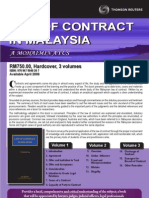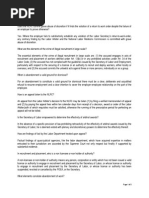Wrongful Dismissal
Wrongful Dismissal
Uploaded by
MERCYCopyright:
Available Formats
Wrongful Dismissal
Wrongful Dismissal
Uploaded by
MERCYOriginal Description:
Copyright
Available Formats
Share this document
Did you find this document useful?
Is this content inappropriate?
Copyright:
Available Formats
Wrongful Dismissal
Wrongful Dismissal
Uploaded by
MERCYCopyright:
Available Formats
Wrongful dismissal
The Employment Act, 2007 makes a distinction between termination and dismissal. It
distinguishes unfair termination and wrongful dismissal.
Section 41 (1) of the employment Act provides that an employer shall before terminating the
employment of an employee on the grounds of misconduct, poor performance or physical
incapacity explain to an employee in language the employee understands, the reasons for
termination and the employee shall be entitled to have another employee or a shop floor un
ion representative of his choice present during this explanation. The Claimant contends that
the Respondent never explained to him the reasons for intended dismissal.
Furthermore, Section 41 of the Employment Act, 2007 prescribes that in event of termination
on account of misconduct or poor performance, the employee will be given a notice and a
hearing. As was held in Shankar Saklani –Versus- DHL Global Forwarding (K) Limited
[2012]eKLR a notice and a hearing are mandatory and necessary even in cases of summary
dismissal only that in summary dismissal, the notice is permissible to be shorter than is
prescribe by statute or contract
In terms of section 44 of the Act an employer may only resort to summary dismissal when the
employee has, by his or her conduct fundamentally breached his or her obligations arising
under the contract of service. It is only a misconduct that is gross in nature that will entitle the
employer to summarily dismiss an employee. The following instances of misconduct will
amount to gross misconduct as to justify the summary dismissal of an employee, that is to say;
i. absenteeism from work without leave or other lawful cause,
ii. intoxication to the extent of being incapable of performing his or her duties during
working hours,
iii. willful neglect to perform his/her work or doing so carelessly and improperly;
iv. using abusive or insulting language towards his or her employer;
v. failing or refusing to obey lawful commands issued within the scope of his or her
employment by his or her employer or a person placed in authority over him/her by the
employer,
vi. if arrested for a cognizable offence punishable by imprisonment and is not released on
bail or bond or otherwise lawfully set at liberty within 14 days, or
vii. if an employee commits or, on reasonable and sufficient grounds, is suspected of having
committed a criminal offence against or to the substantial detriment of the employer or
the employer’s property.
This list is not exhaustive and there will be other instances not enumerated above.
Section 45 (2) provides that a termination of employment by an employer is unfair the
employer fails to proof:-
a) That the reason for termination is valid.
b) That the reason for the termination is a fair reason(s)
c) That the employment was terminated in accordance with fair procedure.
According to section 47(5) the burden of proving that the dismissal was wrongful rests on the
employee, while the burden of justifying the grounds of wrongful dismissal rests on the
employer.
The test to be applied is now settled. In the case of the Judicial Service Commission v
Gladys Boss Shollei, Civil Appeal No.50 of 2014, this Court cited with approval approval the
following passage from the Canadian Supreme Court decision in Mc Kinley v B.C.Tel. (2001)
2 S.C.R. 161
“Whether an employer is justified in dismissing an employee on the grounds
of dishonesty is a question that requires an assessment of the context of the
alleged misconduct. More Specifically the test is whether the employee’s
dishonesty gave rise to a breakdown in the employment relationship. This test
can be expressed in different ways. One could say, for example, that just
cause for dismissal exists where the dishonesty violates an essential condition
of the employment contract, breaches the faith inherent to the work
relationship, or is fundamentally or directly inconsistent with the employee’s
obligations to his or her employer.”
The remedies for wrongful dismissal are listed under section 49 of the Act and include:-
“(a) the wages which the employee would have earned had the employee
been given the period of notice to which he was entitled under this Act or his
contract of service;
(b) … the proportion of the wage due for the period of time for which the
employee has worked; and any other loss consequent upon the dismissal and
arising between the date of dismissal and the date of expiry of the period of
notice which the employee would have been entitled to by virtue of the
contract; or
(c) the equivalent of a number of months wages or salary not exceeding
twelve months based on the gross monthly wage or salary of the employee at
the time of dismissal,”
In deciding which remedy to give an employee who has wrongfully been dismissed the court
exercises a judicial discretion and like the labour officer will be guided only by the principles
contained in section 49 (4) namely, the wishes of the employee, the circumstances in which
the termination took place including the extent to which the employee contributed to the
termination, the employee’s length of service with the employer,
“(f) …the reasonable expectation of the employee as to the length of time for which
his employment with that employer might have continued but for the termination;
(g) the opportunities available to the employee for securing comparable or suitable
employment with another employer;
(h) the value of any severance payable by law;
(i) the right to press claims or any unpaid wages, expenses or other claims owing to
the employee;
(j) any expenses reasonably incurred by the employee as a consequence of the
termination;
(k) any conduct of the employee which to any extent caused or contributed to the
termination;
(l) any failure by the employee to reasonably mitigate the losses attributable to the
unjustified termination; and
(m) any compensation, including ex gratia payment, in respect of termination of
employment paid by the employer and received by the employee.”
Turning to the award of gratuity, the first thing that we must emphasise is that gratuity, as the
name implies, is a gratuitous payment for services rendered. It is paid to an employee or his
estate by an employer either at the end of a contract or upon resignation or retirement or upon
death of the employee, as a lump sum amount at the discretion of an employer. The employee
does not contribute any sum or portion of his salary towards payment of gratuity. An employer
may consider the option of gratuity in lieu of a pension scheme. Being a
gratuitions payment the contract of employment may provide that the employer shall not pay
gratuity if the termination of employment is through dismissal arising from gross or other
misconduct. But where, like here, the dismissal is not justified and is wrongful the employee
will be awarded gratuity if it is provided for in the contract of employment.
You might also like
- Reading Comp Blaw 3905Document27 pagesReading Comp Blaw 3905valerie100% (1)
- DOUGLAS V MIKHAEL BC202311541Document29 pagesDOUGLAS V MIKHAEL BC202311541khiemngo.auNo ratings yet
- Accounting Funeral Service CompendDocument25 pagesAccounting Funeral Service Compendasafoabe4065No ratings yet
- Official Form 309A (For Individuals or Joint Debtors) : Order and Notice of Chapter 7 Bankruptcy Case 01/19Document3 pagesOfficial Form 309A (For Individuals or Joint Debtors) : Order and Notice of Chapter 7 Bankruptcy Case 01/19Anonymous Te6DQINo ratings yet
- Law of Contract in MsiaDocument1 pageLaw of Contract in Msiadato__putihNo ratings yet
- Accounting Firm HandoutDocument13 pagesAccounting Firm HandoutHannah MontillanaNo ratings yet
- Philippine Overseas Labor Office (POLO) Singapore: Owwa Membership/ Contract Verification/ Oec Application Process FlowDocument7 pagesPhilippine Overseas Labor Office (POLO) Singapore: Owwa Membership/ Contract Verification/ Oec Application Process FlowIcko Syrus CeraNo ratings yet
- Law of Contract Zzds (Part I)Document27 pagesLaw of Contract Zzds (Part I)Yi JieNo ratings yet
- Assignment 5 - Wrongful DismissalDocument3 pagesAssignment 5 - Wrongful DismissalAraceli Gloria-Francisco100% (1)
- Expungement PDFDocument6 pagesExpungement PDFViwe MazingiNo ratings yet
- What Are The Essential Elements of A JudgmentDocument2 pagesWhat Are The Essential Elements of A JudgmentRitika KambojNo ratings yet
- Hawaii Supreme Court Ruling On BLNRDocument21 pagesHawaii Supreme Court Ruling On BLNRHNN100% (1)
- TIGTA Report: IRS Employees With Tax/Conduct Issues Continue To Receive AwardsDocument28 pagesTIGTA Report: IRS Employees With Tax/Conduct Issues Continue To Receive AwardsFedSmith Inc.No ratings yet
- FBI Mueller 111021 Complaint Cover SheetDocument2 pagesFBI Mueller 111021 Complaint Cover SheetChristian PonceNo ratings yet
- Constitutional Monarchy, Rule of Law and Good GovernanceDocument462 pagesConstitutional Monarchy, Rule of Law and Good GovernanceAnonymous bUC8uMNo ratings yet
- SEPA Creditors GuideDocument30 pagesSEPA Creditors GuideamraouaNo ratings yet
- United Nations General AssemblyDocument13 pagesUnited Nations General AssemblyAnonymous UpWci5No ratings yet
- Liability of Directors in Dishonour of Cheques by R. Rajesh 7Document4 pagesLiability of Directors in Dishonour of Cheques by R. Rajesh 7somrajNo ratings yet
- ATF Adverse Action and DisciplineDocument46 pagesATF Adverse Action and DisciplinedcodreaNo ratings yet
- Banking Module-1Document6 pagesBanking Module-1sagar bevoorNo ratings yet
- The Benefits of Good Loan Structuring: Cameron McraeDocument3 pagesThe Benefits of Good Loan Structuring: Cameron McraeRoman AhmadNo ratings yet
- Advanced Excel Training ManualDocument6 pagesAdvanced Excel Training ManualAnkush RedhuNo ratings yet
- How Bank Makes MoneyDocument2 pagesHow Bank Makes Moneyudaykumar100% (1)
- Privity of Contract MBADocument3 pagesPrivity of Contract MBABabasab Patil (Karrisatte)100% (1)
- No 17 Discharge of ContractDocument13 pagesNo 17 Discharge of Contractproukaiya7754No ratings yet
- 11iffll 11111iih I11Iah111: McdivittDocument4 pages11iffll 11111iih I11Iah111: McdivittjamesNo ratings yet
- Act 171 - Local Government Act 1976Document132 pagesAct 171 - Local Government Act 1976Muhammad Shah Nidzinski El-ZamaniNo ratings yet
- CL 9 Democratic RightsDocument25 pagesCL 9 Democratic RightsAarushNo ratings yet
- Promissory EstoppelDocument2 pagesPromissory EstoppelRaja Sanmanbir SinghNo ratings yet
- Karnataka Stamp ActDocument53 pagesKarnataka Stamp ActAkshay BhatiaNo ratings yet
- Law of TerminationDocument21 pagesLaw of Terminationنور امالينا زاينون100% (1)
- Taxes & Statutory Deductions On Employment IncomeDocument1 pageTaxes & Statutory Deductions On Employment IncomeNandanan KananpulakkalNo ratings yet
- Mercantile LawDocument21 pagesMercantile LawPriyanka BarikNo ratings yet
- SummonsDocument8 pagesSummonssampichardoNo ratings yet
- Contracts II OutlineDocument27 pagesContracts II OutlinenkassatlNo ratings yet
- Car Rental Agreement TemplateDocument4 pagesCar Rental Agreement TemplateAdil ArbabNo ratings yet
- Powel vs. Lee Case Analysis: Project Report of Ii Semester, January 2019 Law Contract Law-IDocument20 pagesPowel vs. Lee Case Analysis: Project Report of Ii Semester, January 2019 Law Contract Law-IBhavya TewariNo ratings yet
- Absolute MonarchyDocument18 pagesAbsolute MonarchyOMEN21No ratings yet
- Business Law 2Document20 pagesBusiness Law 2Manan SharmaNo ratings yet
- Law of Damages in IndiaDocument52 pagesLaw of Damages in IndiaAishwarya PandeyNo ratings yet
- Conspiracy To Injure FinalDocument9 pagesConspiracy To Injure FinalAbraham AuNo ratings yet
- Judgements of Courts of Justice When Relevant Under IEADocument25 pagesJudgements of Courts of Justice When Relevant Under IEAmitali100% (1)
- Issuance of A Show Cause LetterDocument4 pagesIssuance of A Show Cause LetterFaiz Zealot100% (1)
- Property Law ProjectDocument19 pagesProperty Law ProjectDashampreetNo ratings yet
- Appearance& Non-Appearance of Parties-Order IxDocument6 pagesAppearance& Non-Appearance of Parties-Order IxAayat AhmadNo ratings yet
- Bba 140Document7 pagesBba 140Larry NamukambaNo ratings yet
- AgencyDocument41 pagesAgencySimeony SimeNo ratings yet
- Contract 1 - Contract by MinorsDocument25 pagesContract 1 - Contract by Minorsattorney000% (1)
- School of Business Management College of Business Universiti Utara MalaysiaDocument34 pagesSchool of Business Management College of Business Universiti Utara MalaysiaVishan VasugiNo ratings yet
- Michael Tellinger Appeal SynopsisDocument8 pagesMichael Tellinger Appeal SynopsisCensored News NowNo ratings yet
- Equity Notes InjunctionsDocument4 pagesEquity Notes InjunctionsMegan TraversNo ratings yet
- Undertakings in and Out of CourtDocument30 pagesUndertakings in and Out of CourtIgor Ellyn, QC, CS, FCIArb.No ratings yet
- The Theory of Andragogy Applied To Police TrainingDocument19 pagesThe Theory of Andragogy Applied To Police Trainingdarkbyrons100% (1)
- Chapter-4 Banker and The CustomerDocument8 pagesChapter-4 Banker and The CustomerSamuel DebebeNo ratings yet
- Specimen of Surity BondDocument2 pagesSpecimen of Surity BondMian Badar100% (1)
- Remedies in ContractDocument14 pagesRemedies in ContractAnonymous VoAWuOhnNo ratings yet
- Revocation of Offer and AcceptanceDocument1 pageRevocation of Offer and Acceptancearidaconcept0% (1)
- The Jurisprudence on Regional and International Tribunals DigestFrom EverandThe Jurisprudence on Regional and International Tribunals DigestNo ratings yet
- Labor Law Review Finals Guide Questions and AnswersDocument25 pagesLabor Law Review Finals Guide Questions and AnswersJulie PajoNo ratings yet
- 2023 - Labor Law Notes'Document13 pages2023 - Labor Law Notes'Aisha Mie Faith FernandezNo ratings yet
- Discuss The Legal Provisions Regarding Termination of Employment and Discuss The Remedies To An Employee Whose Contract Has Been TerminatedDocument3 pagesDiscuss The Legal Provisions Regarding Termination of Employment and Discuss The Remedies To An Employee Whose Contract Has Been TerminatedlydiamuhandiaNo ratings yet
- FAQ - S On Labor LawDocument5 pagesFAQ - S On Labor LawBenitez GheroldNo ratings yet
- Research Paper Open AccessDocument14 pagesResearch Paper Open AccessAJHSSR JournalNo ratings yet
- Chapter-5 ETCDocument15 pagesChapter-5 ETCLogo Studio100% (1)
- Ranjitha .O (Print Out Document)Document64 pagesRanjitha .O (Print Out Document)Nithya RajNo ratings yet
- Maximization of A BusinessDocument2 pagesMaximization of A BusinessRobert BalinoNo ratings yet
- Assessment/Interview Form: Job Ref NosDocument4 pagesAssessment/Interview Form: Job Ref NosDaryl Gomez Timatim50% (4)
- Offer Letter-IntelenetDocument2 pagesOffer Letter-Intelenetkkarthi557No ratings yet
- This Study Resource Was: Assessment Task 4 InstructionsDocument7 pagesThis Study Resource Was: Assessment Task 4 Instructionsnaresh kumarNo ratings yet
- THR81 SQ1 WithoutanswersDocument23 pagesTHR81 SQ1 WithoutanswersSARAHNo ratings yet
- SAAR Integrated Services PVT LTD:, A Group Company of SA AssociatesDocument11 pagesSAAR Integrated Services PVT LTD:, A Group Company of SA Associatesதமிழக மாற்று திறனாளிகள்No ratings yet
- Dpb10023-Problem Scenario PomDocument9 pagesDpb10023-Problem Scenario PomShanti Devi WisvanathanNo ratings yet
- Admin Chapter 8 Case DigestDocument9 pagesAdmin Chapter 8 Case DigestAlexandra Nicole Cabael100% (1)
- The Five Persons in The RIAI ContractDocument4 pagesThe Five Persons in The RIAI ContractLetgo_01No ratings yet
- MA1 (Mock 2)Document19 pagesMA1 (Mock 2)Shamas 786No ratings yet
- Era 2007Document5 pagesEra 2007NoreenNo ratings yet
- Dansart Security v. BagoyDocument2 pagesDansart Security v. BagoyrNo ratings yet
- MPRES GoldMining PDFDocument8 pagesMPRES GoldMining PDFgetasewNo ratings yet
- Business Responsibility Report 2012-13Document5 pagesBusiness Responsibility Report 2012-13Gautam JainNo ratings yet
- MCQ ModelDocument11 pagesMCQ ModelRahul RavindranathanNo ratings yet
- Salenga v. Court of Appeals, G.R. Nos. 174941, February 1, 2012Document11 pagesSalenga v. Court of Appeals, G.R. Nos. 174941, February 1, 2012Tea AnnNo ratings yet
- Labor Digest - FUADocument5 pagesLabor Digest - FUAkathNo ratings yet
- DOLE Payroll Computation ApprovalDocument2 pagesDOLE Payroll Computation ApprovalJohnLeonardTernidaNo ratings yet
- ISHRMDocument5 pagesISHRMsameerkhan855No ratings yet
- Cancellation or Suspension of License Authority by Roy RebosuraDocument9 pagesCancellation or Suspension of License Authority by Roy RebosuraJannah Mae de OcampoNo ratings yet
- Republic Act No. 6713 Section 8. Statements and Disclosure. - Public Officials and Employees Have An Obligation To Accomplish and SubmitDocument3 pagesRepublic Act No. 6713 Section 8. Statements and Disclosure. - Public Officials and Employees Have An Obligation To Accomplish and SubmitAlisa WadeNo ratings yet
- Labor LawDocument2 pagesLabor LawMerlajoy VillanuevaNo ratings yet
- Womens Legal Rights HandbookDocument212 pagesWomens Legal Rights Handbooksupriya kadamNo ratings yet
- Report of The President Keith D. HillDocument21 pagesReport of The President Keith D. HillChicago Transit Justice CoalitionNo ratings yet
- Business LawDocument3 pagesBusiness Lawaisha yousafNo ratings yet

























































































